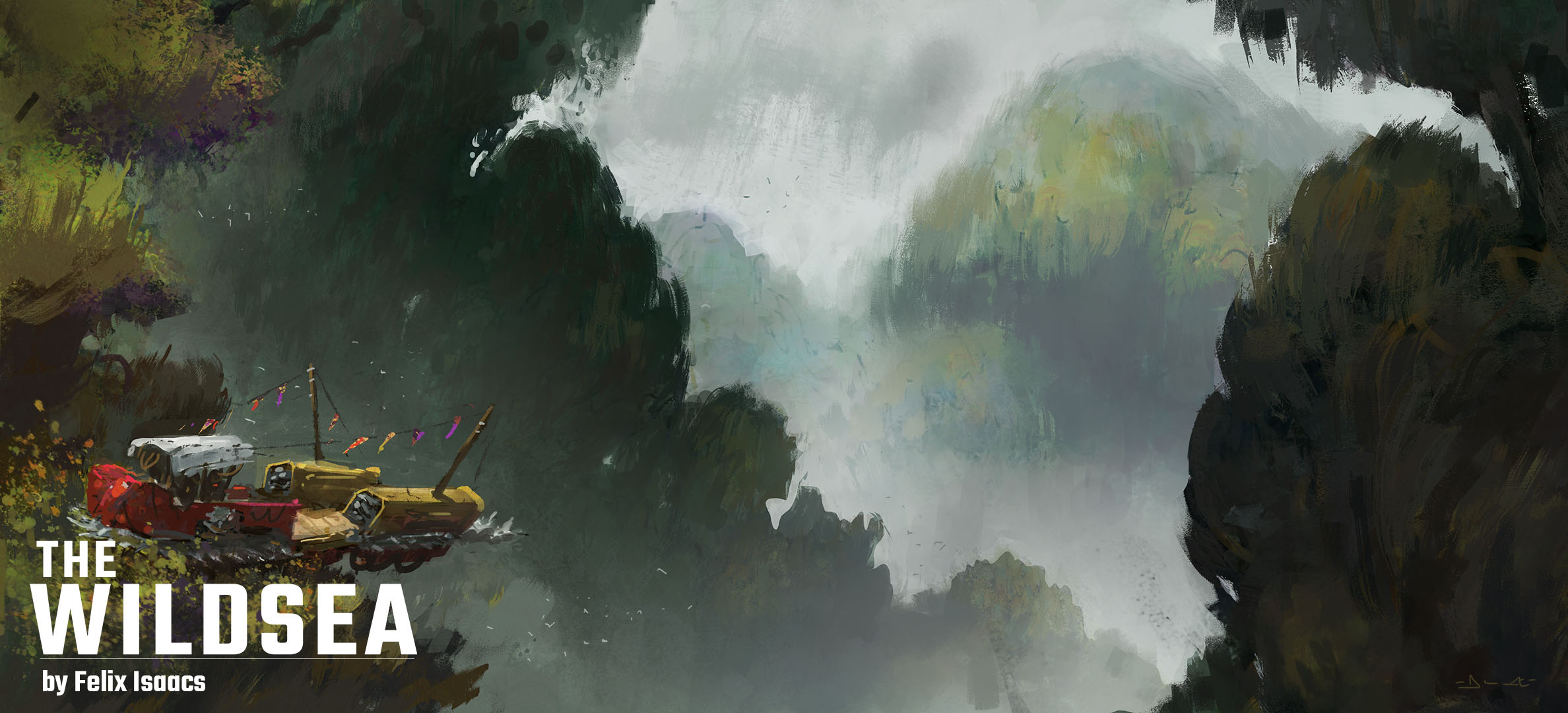A forest has consumed the planet. Trees the size of skyscrapers cover every inch of airable land. Only isolated mountaintops remain as proof of the ground far below. You command the crew of a chainsaw driven ship that “sails” this verdant expanse. Your crew are humans, cactus-people, humanoid insect colonies, and mushroom men. Not to mention the “weirder” members, like reanimated ship-golems, octopus people, and moth-folk. You are those who ply the rustling waves. Welcome to Wildsea.
Wildsea is an incredibly imaginative RPG packed with amazing weird fiction. I have some complaints with the included ruleset, but I also have to call out the book’s focus on approachability and it’s robust GM’s toolkit. For a book about such a weird world, it’s one of the most down-to-earth and approahable RPGs I’ve seen.
Let’s start with the world because the world of Wildsea is sodding fantastic. The whole surface of the planet has been choked over by a cataclysmic event called “The Verdancy”. This event claimed practically all low-elevation land, leaving only scattered mountaintops as viable refuge from the endless growth. Civilization exists only in dense pockets perched atop these precarious heights. Trade is handled by merchants who cross the dangerous Wildsea on ships rigged with massive chainsaws along their hulls. These chainsaw ships tear through the upper canopy, pulled along by immense metal teeth. The sea grows back behind them, so verdant that all evidence of damage is gone within hours. The players take the role of the crew of one of these ships. This world is rich with detail and ripe for adventure. I want to to play in it. but that brings us to the elephant in the branches: The rules.
While I adore the worldbuilding, I’m not the biggest fan of the “Wild Words” engine that fuels the fiction. The engine has some sound underpinnings, but I feel that the resolution mechanic is sadly lacking. Basically, Wild Words is a D6 “dice pool” system. You add 6-sided dice to a pool of dice based on your character’s stats, skills, and resources. You compile together your various advantages, then roll the dice. You then look for your highest roll. A 6 is a flat success, a 5 or a 4 is a success with a cost (lose resources, etc.), 3, 2, and 1 are failures that add a narrative complications. There’s some other rules, but this is the core of the system. The issue I have is with “The Cut”, which is how the GM (cutely/superfluously called a “Firefly” in Wildsea) can adjust the odds. The Cut takes away your best roll. So a Cut of 1 takes your highest die, a cut of 2 takes your 2 highest dice, etc. The problem with this system is that it’s mathematically kind of garbage. I may do a deep dive on it sometime, but basically it’s impossible to tell at-the-table whether a roll is easy, average, hard, or Very Hard. It’s a messy mechanic, and I like my resolution mechanics fairly clean.
Despite my complaints about the rules, I do have to applaud Wildsea’s approachability. Unlike a lot of other indy RPG products, Wildsea dedicates a good chunk of the book to training players and GMs alike in how to play, both how to play Wildsea specifically, as well as how to play RPGs in general. The book assumes you’ve never run an RPG before. One could argue that stance is staggeringly nieve, but it’s also refreshing to see a book that refuses to speak to the obvious audience of hardcore RPG fans. This book wants to be your first RPG, and critically, tries to make that easy. Even though I don’t agree with the ruleset, I’d highly reccomend reading this book just to glean it for ideas.
So can I reccomend Wildsea as an RPG? Sadly, no. I’ve got serious issues with the Wild Words engine that powers this product, and I just flat out think there are better RPG engines. However, it’s phenomenal worldbuilding and its sheer unrelentingly inclusive attitude stop me from writing it off altogether. GMs should read this book. Even if you’re never going to run it at a table, there’s too much good stuff in here to just ignore.

